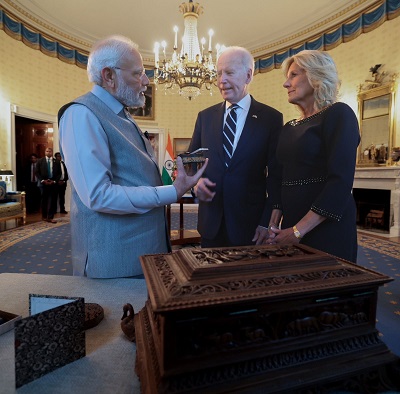New Delhi, (Samajweekly) India has been a big foreign exchange earner from IT and IT services. Our leading companies were earlier targeted as body shopping outfits and many thought that they would wind up post Y2K.
Nothing of that sort happened and India is at the forefront of this sector and provides onshore and offshore services to the world.
Similarly, India was considered a major player in the diamond cutting and polishing business and providing labour. It was an important activity but the share of the pie that India earned was very small and was highly labour intensive.
Nobody thought India could go beyond that and was considered just a skilled labour provider in the diamond trade. Come the era of lab-grown diamonds and things began to change and change quickly. The change was swift and affected the way diamonds were traded globally.
De Beers is the world’s largest diamond trading company and supplier. Lately, it spoke of reducing the supply of diamonds in rough form to India and there were serious repercussions as the world depends on India for the cutting and polishing of diamonds.
In the case of natural diamonds, the rough diamonds are imported by Indian companies and then cut and polished. Post this, a small quantity of diamonds are converted into jewellery and sold domestically and also finished jewellery is exported. The bulk of the imports are re-exported in cut and polished form.
Surat is one of the most significant places in the diamond trade in India. The place employs thousands of artisans in the business of cutting and polishing. This is a skilled job and there are many families where the skill set has passed from generation to generation.
The city is also famous for textiles but the dominant business is the diamond cutting and polishing. The advent of lab grown diamonds has changed the outlook of this industry completely.
First, the entire value chain of lab-grown diamonds being manufactured today is based in India. These roughs are then cut and polished and then either sold in India or abroad. Jewellery is also made from these and finished jewellery is exported all over the world.
The most important facet of lab-grown diamonds business is that the labour charges paid to the artisan for cutting or polishing is the same per diamond irrespective of the fact that it is a natural diamond or lab-grown diamond.
Second, the entire value chain from diamond manufacturing to cutting and polishing and then converting into jewellery is all captured in India. It is the greatest thing that could have happened in this business.
The last visit of the Indian PM to the United States saw the US First Lady, Jill Biden, being gifted a lab-grown diamond which was manufactured, cut and polished and fully processed in India. This was gifted and acted as a great testimony to India’s quality standards and manufacturing capabilities.
One could say that the gift was a way of saying to the US and the world that India has arrived on the world stage and would be a significant player in this business where we have a major edge in the cutting and polishing business already.
The advent and growth in acceptance of lab-grown diamonds, in fact, is the best thing that could have happened to India from a business perspective.
On a lighter note, it may also be said that the PM was acting as a mascot for the lab grown diamond industry of India and used the stage of the USA to make a pitch.
I had the pleasure of meeting some large Indian entrepreneurs who are in the lab grown diamond business manufacturing and I asked them with the advent of technology and refinement in the business of growing diamonds whether the Kohinoor diamond taken from India and lying in the UK could ever be replicated. While all said yes, the time to do so really shocked me.
I was told that in the next five years or so, this event would happen. Just imagine on a lighter note if the Kohinoor is replicated, it would lose its value as a one of its kind natural diamond.
What began as a laboratory exercise has today become a fad with the younger generation who always hated diamonds as being too expensive and not having a resale value as gold and gold jewellery. These people are now flocking to buy lab-grown diamonds.
They are available at much cheaper prices which vary from 10-15 per cent in value of natural diamonds, have lustre and shine and look as good as natural. A naked eye cannot differentiate.
A win-win situation for manufacturers who are setting up reactors to produce the lab grown diamonds in Surat, cutting and polishing them there, and then exporting in multi form as jewellery or just finished diamonds.
Local demand for lab-grown diamond jewellery has grown by leaps and bounds as affordability has increased and also acceptability. It has become fashionable and trendy.
In time to come in the near future, quantum of exports from India of lab grown diamonds would grow manifold.









